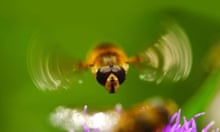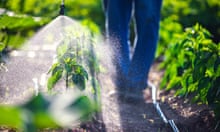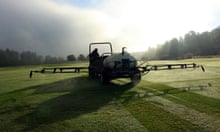Germany has said it will phase out the controversial weedkiller glyphosate because it wipes out insect populations crucial for ecosystems and pollination of food crops.
The chemical, also suspected by some experts to cause cancer in humans, is to be banned by the end of 2023 when the EU’s approval period for it expires, ministers said.
Biologists have sounded the alarm over plummeting insect populations that affect species diversity and damage ecosystems by disrupting natural food chains and plant pollination.
“What harms insects also harms people,” said environment minister Svenja Schulze, of the centre-left Social Democrats, who warned of a future when fruit could become a luxury.
“What we need is more humming and buzzing,” added Schulze, stressing that “a world without insects is not worth living in”.
Farm groups and the chemical industry have lobbied for the continued use of glyphosate, which is sold under the trade name Roundup made by Bayer subsidiary Monsanto.
Bayer objected to Germany’s unilateral ban, arguing the chemical could be used safely and was “an important tool for ensuring both the sustainability and productivity of agriculture”.
After its takeover of Monsanto last year, Bayer has been battered with a wave of lawsuits alleging the flagship herbicide causes cancer, with juries awarding massive compensation.
The German Chemical Industry Association complained that, with EU authorities due to re-evaluate glyphosate use in 2022, Berlin was “embarking on a confrontation course with European law”.
Austria became the first EU member to outlaw glyphosate use in July, with restrictions also in force in the Czech Republic, Italy and the Netherlands. France is planning to phase it out by 2023.
Angela Merkel’s government presented its plan after heated internal debate between Schulz and the more industry friendly agriculture minister, Julia Klöckner, of the chancellor’s centre-right Christian Democrats.
In a first phase, glyphosate will be banned from next year in city parks and in private gardens, according to the policy roadmap, which sets the basis for new laws and regulations.
Herbicide and insecticide use will also be restricted or banned in more species-rich areas such as grasslands and orchard meadows, and along many river and lake shores.
Campaigners worldwide have highlighted the risks of declining insect numbers, noting they are vital for pollinating plants – including food crops – and as food sources for birds and other animals.
In February, a record 1.75 million people in the prosperous southern German state of Bavaria voted in a referendum to “save the bees”, calling for less chemical use and more organic farming and green spaces.
The campaign was opposed by the powerful regional agriculture association, which urged the population to “stop bashing farmers”.
However, Bavaria’s ruling conservative CSU party announced it would turn the referendum into government policy.
The roadmap presented on Wednesday also featured a new voluntary animal welfare label introduced by Klöckner that aims to help consumers recognise when buying pork how the pigs are raised.
Activist group Germanwatch criticised the initiative, arguing that consumers would continue to be “misled”, for example by packaging that suggested idyllic farm conditions on meat products that in reality came from industrial feed lots.
Merkel’s cabinet also plans to earmark a greater share of EU farm subsidies it receives to environmental and climate protection, raising the share from 4.5% to 6% next year.










